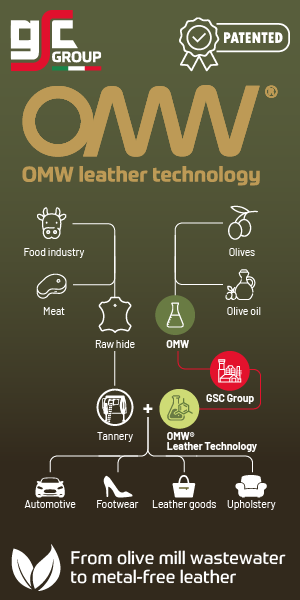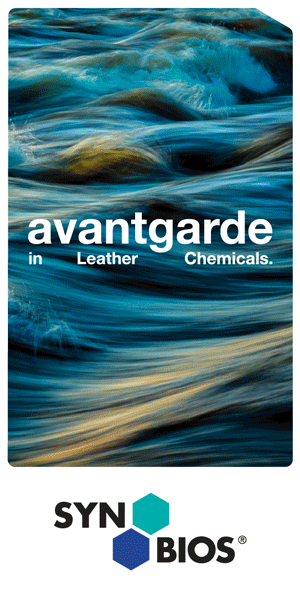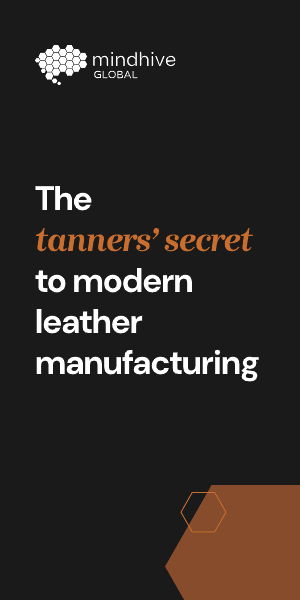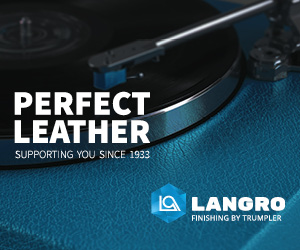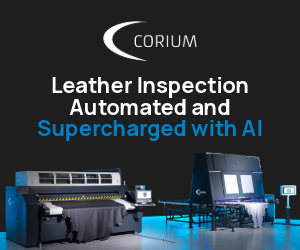Ideas factory: Guilherme Motta

As the largest leather manufacturer in the world, JBS Couros processes high volumes of hides. In recent years, though, it has focused not just on volume but on innovation, too, resulting in a string of new ideas for its leather collections.
What is the extent of JBS Couros’s activity now, in mid-2023. How many tanneries are there? How many employees? How many hides are you processing per month or per year?
JBS Couros was founded in 2009 as a business unit of the largest food producer in the world, JBS. Since the beginning, the business unit is an important part of the strategy to add value to JBS’s production chain and has become the largest leather manufacturer in the world. JBS Couros has more than 7,000 workers in nine countries on three continents, with 22 plants, six business offices, three cutting plants, five logistics facilities, four showrooms, one private port terminal and two research centres. The company is responsible for producing large volumes of wet blue, wet white, crust and finished leather. We make quality products that are widely consumed by global automotive, furniture and footwear manufacturers and others. We offer branded products under our Kind Leather, Kind Leather EVO, Zenda, V-block and Conceria Priante brands , all of them focused on the high end of the market. Besides that, we have Leather Labs, an initiative aimed at e-commerce. It is an online shopping tool for professional buyers to source sustainable, Brazilian leather.
What are the particular challenges in running such a large group with operations in so many different parts of the world?
One of the main JBS business strategies is geographic diversification. Considering that our raw materials come from the production cycle of JBS meat plants, arranging a wide leather supply chain in strategic territories has also become an important asset of business to the company and its units around the world. This is linked to global awareness of reducing carbon footprint and is helping us move towards a carbon net-zero production chain.
It’s now four years since JBS Couros introduced Kind Leather. What impact has Kind Leather had on your customers and on the wider leather industry?
The impact has been significant. JBS Couros brought innovation to the leather industry when it created Kind Leather in 2019. This new technique includes processing only a part of each hide, giving the hides we tan a new shape. This ensures better use of raw materials and allows scraps to go for use in the beauty, food, health and pharmaceutical industries. Overall, we are generating up to 93% less waste, consuming up to 62% less electricity and up to 52% less water. In 2020, we had an excellent result in a lifecycle assessment (LCA) of Kind Leather. The methodology was developed and applied by Spin360, an Italian company specialised in the leather sector. This result confirmed that JBS Couros has introduced design remodelling to the chain, confronting standards previously considered inherent to the production system. The research also confirmed Kind Leather has found a way to minimise environmental impacts for the sector.
During covid-19, JBS V-Block seemed to be an idea that was very much ‘of the moment’. How was this product, a range of leather with antiviral functionality, received at the time? Is it still part of the JBS Couros offering?
Our clients from all over the world were very accepting of V-Block and it is still in our portfolio; it is a high-quality offering. We developed it in nine months. It was not so much that there was a real demand for leather with antiviral functionality at the time, but it became an important option that added value to our customers’ finished products and to our own value chain. Besides that, V-block also proved the leather trade’s resilience in a time of global economic crisis.
In contrast, your EVO range, enhancing the durability and longevity of leather, seems like a very appropriate idea for the time ahead when consumers will see the economic and environmental benefits of long-lasting products. How well has this idea been received?
We see EVO being very well accepted by the market, mainly after the restrictive period of the pandemic. There was also a demand increase for upholstered surfaces and for coatings to have greater durability. Besides that, as markets and people have been demanding more sustainability and responsibility from every sector, a more durable leather like EVO has come to be of more value in addition to leather’s status as a natural solution resulting from a by-product from the food industry.
We often talk about the feel of leather as one of its main attractions. In this context, what difference can an idea like Leather Labs make?
Our Leather Labs platform also emerged during the pandemic as an idea for bringing consumers closer to the leather industry and promoting knowledge of the market. JBS Couros’s proposal with this project is breaking through some paradigms and prejudices about the world of leather, offering to consumers knowledge of the variety of the leather articles available and allowing them to get to know and admire many kinds of materials. Besides that, there is also a social proposal with the Leather Labs platform because it offers courses to help people find alternative ways of getting a complementary source of income and gaining knowledge about the importance of the circular economy.
It is now eight years since JBS Couros acquired the Priante tannery in Italy. Please sum up the contribution that Priante is making to the group, especially in terms of innovative ideas.
Conceria Priante is a very important business to JBS Couros. Through it, we have been able to connect to many important markets. Currently, Conceria Priante is our global centre for research and development. Today this unit receives inputs from our operations all over the world, and defines leather trends for us, always focusing on high quality and the wide variety of products we design for different segments. Product lines including Kind Leather, EVO, V-Block and Essntial, a collection of leather articles that give off a floral or wood aroma, emerged from there.
Brazil is still the group’s home. How do you view Brazil’s position in the global leather industry in the 2020s?
Brazil’s vocation is to be the world’s breadbasket. Its potential to fulfil this is due to its strategic geographic position, available technology and techniques that have developed over the years to raise cattle. It is capable of increasing production with a balanced use of natural resources. Brazil is at the forefront of protein production in the world and JBS Couros plays an important role in this chain. Thus, as one of the world’s largest food producers and a leader in protein processing, with a network of 25,000 active cattle suppliers throughout Brazil, JBS’s mission is to go beyond feeding the world. The company wants to meet this commitment in a balanced way and pushes all its companies, including JBS Couros, in this direction. One example of this commitment is that JBS was the first company in the protein industry to pledge to become net-zero by 2040. As part of this, JBS and JBS Couros understand that establishing a balanced production requires investment in innovation and science and the development of quality technology, keeping an environmental perspective at all times.
President of JBS Couros, the largest leather manufacturer in the world, Guilherme Motta.
all CreditS: JBS COUROS








